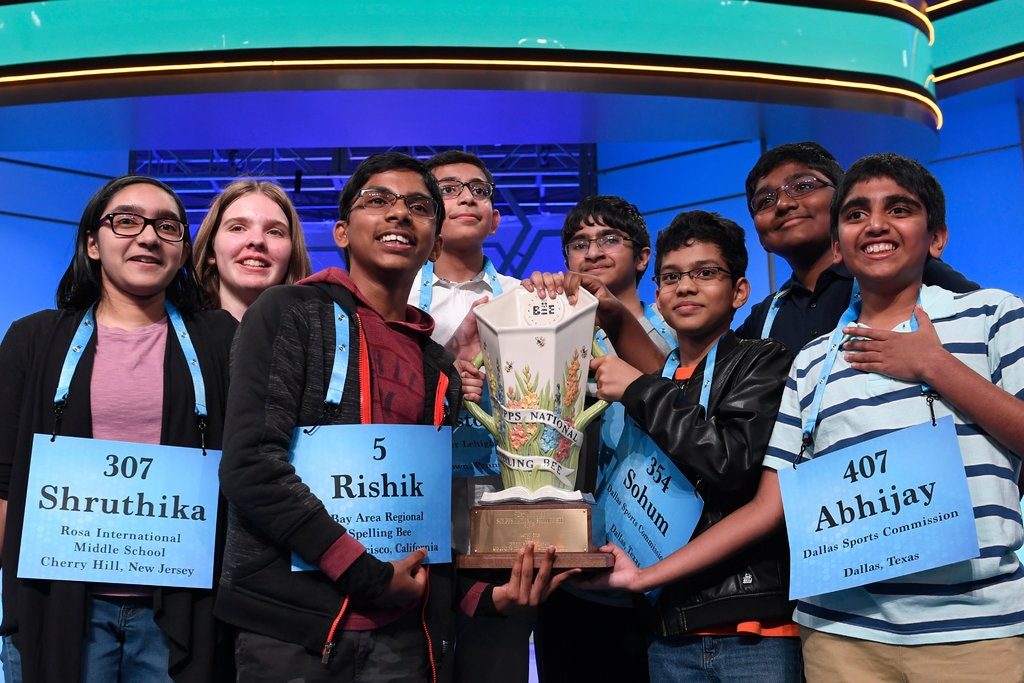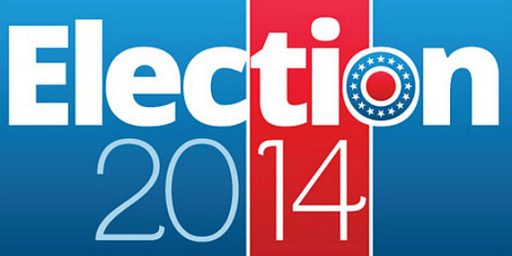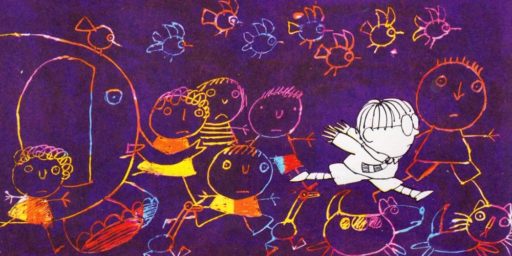National Spelling Bee Ends in 8-Way Tie
Having exhausted their word list and the competitors, the contest ended with octo-champs.

As the event has gained more exposure and professionalized coaching, it’s getting harder to eliminate children from the competition.
In the most extraordinary ending in the 94-year history of the Scripps National Spelling Bee, a record eight spellers were crowned co-champions Thursday night after each correctly spelled a word in the 20th and final round.
Rishik Gandhasri, Erin Howard, Saketh Sundar, Shruthika Padhy, Sohum Sukhatankar, Abhijay Kodali, Christopher Serrao and Rohan Raja spelled the final 47 words correctly in their historic walk-off victory, going through five consecutive perfect rounds at Gaylord National Resort in National Harbor, Maryland.
“Champion spellers, we are now in uncharted territory,” bee pronouncer Jacques Bailly told them in announcing the decision to allow up to eight winners. “We do have plenty of words remaining on our list. But we will soon run out of words that will possibly challenge you, the most phenomenal collection of super spellers in the history of this competition.”
He wasn’t lying. The bee held three more rounds after that announcement, and no one missed a word or even appeared to struggle.
Although the bee had decided to split the first- and second-place money in the event of a tie, those plans were quickly scuttled and each speller was given the full $50,000 cash prize, in addition to a Scripps Cup.
From 2014-2016, the bee ended with co-champions. In 2017 and last year, the bee had a written tiebreaker test of spelling and vocabulary that would be used to identify a single champion if necessary. It didn’t turn out to be needed, and bee officials decided the test was too burdensome and got rid of it.The warning signs of a logjam at the top came earlier Thursday, when the early final rounds, designed to narrow the field from 50 spellers to about a dozen, took 5½ hours and still brought a robust group of 16 kids to the finals.
The bee’s rules called for no more than three spellers to share the title. The possibility of four or more winners wasn’t considered before Thursday. Paige Kimble, the bee’s executive director, said bee officials developed a contingency plan for multiple champions after gauging the spellers’ performance in the earlier final rounds.
“When we began to comprehend the mettle of our finalists, we began to think about what could possibly happen this evening,” Kimble said. “We went into the evening with the plan that we executed on this evening.”
Each winner got a chance to celebrate individually upon completing his or her final word, although some were more demonstrative than others. Shruthika, a 13-year-old from Cherry Hill, New Jersey, was staggering to the microphone before her last few words, and after her final word she wobbled back to her chair and wearily shook the hands of her co-champions, who dubbed themselves “octo-champs.”Sohun, a 13-year-old from Dallas, spoke for the group about how they were all satisfied with the result.
“Spellers improve. It’s natural and the rate at which people are improving is amazing,” said Sohun, a previous winner of both the North South Foundation spelling bee and the South Asian Spelling Bee. “Everyone learns, everyone gets so much better.”
—ESPN, “Spelling Bee ends in unprecedented 8-way tie“
That’s a surprisingly mature reaction. Alas, many of the adults are not having it.
And the consensus among spelling experts in the crowd is that Scripps didn’t nearly exhaust the words in the dictionary that can challenge the best spellers.
“This would never happen at my bee,” said Rahul Walia, founder of the South Asian Spelling Bee, where Sohum defeated Abhijay for the title last year. “They need to use harder words. The words are available.”
I’m sure that’s true although the eight final words were challenging:
Rishik Gandhasri, 13, of San Jose, Calif.: auslaut.
Erin Howard, 14, of Huntsville, Ala.: erysipelas.
Saketh Sundar, 13, of Clarksville, Md.: bougainvillea.
Shruthika Padhy, 13, of Cherry Hill, N.J.: aiguillette.
Sohum Sukhatankar, 13, of Dallas: pendeloque.
Abhijay Kodali, 12, of Flower Mound, Tex.: palama.
Christopher Serrao, 13, of Whitehouse Station, N.J.: cernuous.
Rohan Raja, 13, of Irving, Tex: odylic.
Of those, aiguillette is the only word I’ve ever used in a sentence and I’m not absolutely sure I could have spelled it. I’m not familiar with any of the others, although I could likely have guessed how to spell auslaut, palama, and odylic.
In terms of the outcome, I’m torn. On the one hand, a spelling bee is an elimination event. It ought continue until all but one competitor is eliminated. But, at some point, it becomes an endurance event rather than a test of spelling acumen. As it was, it went past midnight.
As noted at the outset, the reason we’re here is that the event has gone from a bunch of studious kids advancing from their local schools up through nationals to a full-time, professionalized competition. (A phenomenon seen across youth athletic competition as well.)
The majority of the spellers had personal coaches, and 13 of the 16 used word lists and study materials compiled by ex-spellers Shobha Dasari and her younger brother, Shourav. Shobha, who’s 18 and will go to Stanford in the fall, said the proliferation of private coaches and online study guides has simplified speller preparation, but she still gave credit to the champions.
“The kids still have to put in the work,” Shobha said.
Indeed, they do.
Interestingly, despite being called the National Spelling Bee—and all eight champions this year being American—the competition is actually international. According to CNN‘s reporting:
This year’s competition started on Sunday with 562 spellers — all of whom are 15 or younger but have not passed eighth grade — who made it to the national stage. Contestants came from all 50 states, as well as several territories and other countries including the Bahamas, Canada, Germany, Ghana, Jamaica, Japan and South Korea.
I’m certainly fine with that but it should be called the World or International Spelling Bee.






Aiguillette is the only word I could have guessed the meaning of. And I would have guessed wrong. My rather complete dictionary app doesn’t even contain entries for the others.
Still, at least I know the meaning of lapidary. Memories go back far here at OTB.
And at the risk (ok, the certainty) of going off topic, I was recently thinking that it would be fun to revisit posts from the early days of OTB. How have views evolved above and below the line (many early-day commenters are still around)? Which predictions have come to pass? Which slippery slopes have we slid down? These blasts from the past might be fun on slow news days.
I’m still unsure what the utility of being able to correctly spell words that can’t be used anyways because no one knows what they mean is.
With tighter entry criteria for the third debate and eventually people actually voting, one hopes the Democrats will do better at elimination than the Spellig Bee.
(I caught the fat finger (iPad virtual keyboard), but decided to leave it for whatever chuckle it’s worth.)
I wonder at the obsession for spelling. It must be the peculiarities of English. It doesn’t seem peculiar to native speakers, I assume, but it is. For one thing, letters don’t always sound the same. For example, take this list of common words, with a few letters highlighted:
Laugh
Women
Intention
If we take the highlighted letters and make a word with them, it comes out as GHOTI. If letters always sounded the same in every word, then GHOTI would spell “fish.”
Many languages have exceptions for sounds on certain letters, but few and these tend to be constant. For example, in Spanish, the letter h is silent (why a silent letter should be kept is a question on its own). But the combinations “ch” and “sh” are sounded the same as in English.
The biggest difficulties in Spanish spelling is remembering the rules for accents (emphasis) in words, and which words use a “c,” which and “s,” and which a “z,” as these are all pronounced the same (c only in conjunction with e and i). These letters often change unpredictably. For example, the word for pencil is “lápiz.” The plural should be “lápizes,” but instead for some reason it’s “lápices.”
The other thing I don’t get is the American extreme aversion to ties.
@Kathy: English has, by far, the most chaotic spelling system in the world. (French is a distant second.) I once did a paper on it in college. It reflects the peculiar history: the loose fit between the Roman alphabet and a Germanic language, the infusion of French after the Norman Conquest and Latin later on, the inconsistent decisions after the invention of the printing press and the attempts to find a uniform standard from a mass of local dialects, the Great Vowel Shift and further shifts in pronunciation while the spelling remained fixed. (In fact the way we spell English today is more reflective of the way it was pronounced over 600 years ago.) When I read a book on the history of Spanish a few years ago, it noted that the relatively phonetic Spanish writing system might be surprising given that Spanish, like English, developed in a country that underwent a series of invasions and infusions from the languages of the invaders (notably Arabic). But somehow they managed to keep it relatively consistent and uniform, in sharp contrast to English.
Unlike some other languages, there have been no major spelling reforms in English, other than the modest ones in the 19th-century in the US, accounting for the way we spell words like color and center compared with other English-speaking countries. By now it would be almost impossible to implement such a project for a language spread across several continents and centered on countries with mass literacy and a lack of centralized government control. Besides, it almost seems like Americans take pride in our ridiculous spelling. That’s why we have spelling bees (only in America, I should add; no other English-speaking nation has them). Trying to get people to write more phonetically (“the dawgz bark throo the nite”) would get most educated people to think we’re promoting illiteracy.
It happens that one of my professors in graduate school (and possibly another who was on my thesis committee) was involved in some of the studies of recasting English to phonetic spelling. IIRC, one of the things his group found interesting was that the students who struggled most with conventional reading books also struggled the most with books done in phonetic spelling. He recalled for us that the reason children gave for struggling with the phonetic spellings was that the words looked strange. Hmmmmm… (Expectations are still expectations even if you can’t make sense of them.)
ETA: One of the students in my first high school used to come to school wearing a tee shirt reading “Hukt on fonix wurkt fur mi.”
It’s been awhile since I participated in the spelling bee, but I believe the next step is a sudden death round, with the smallest child getting his or her first choice of weapon.
…the smallest child getting his or her first choice of weapon.
If the urchin attacks with a rapier wit can there be a succesful defense?